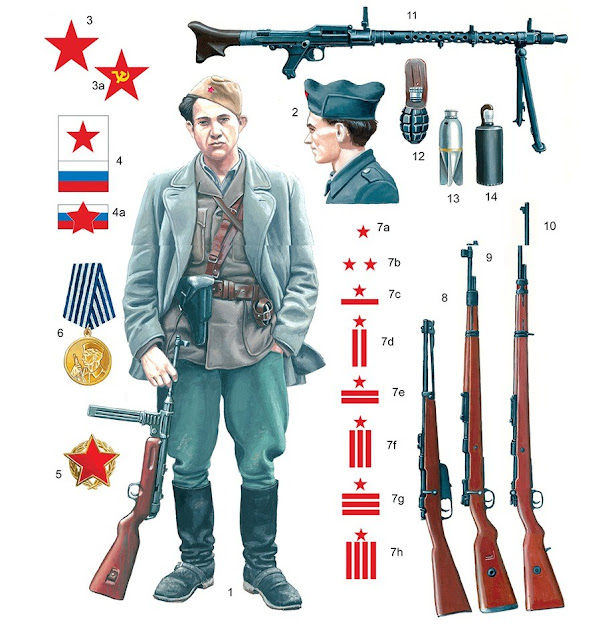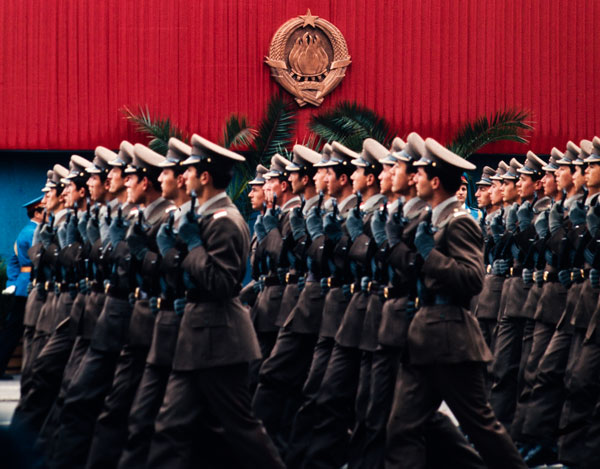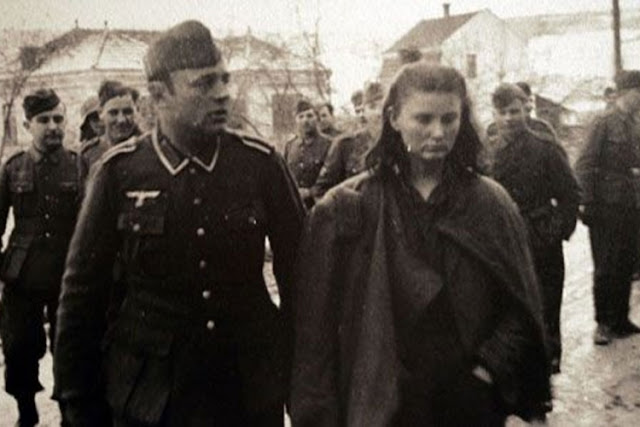Sir Fitzroy Maclean - The Maclean Mission in Yugoslavia - The man who was the inspiration for James Bond.
 |
| Tito talking to Maclean |
Sir Fitzroy MacLean is a famous Scottish soldier, writer, and politician. He was the head of the British military mission to the Yugoslav Partisans.
Maclean wrote several books,
including Eastern Approaches, in which he recounted three extraordinary series
of adventures: traveling, often incognito, in Soviet Central Asia; fighting in
the Western Desert campaign, where he specialized in commando raids behind
enemy lines; and living rough with Josip Broz Tito and his Yugoslav Partisans
while commanding the Maclean Mission there. It has been widely speculated that
Ian Fleming used Maclean as one of his inspirations for James Bond.
 |
| Fitzroy MacLean on Vis in 1944. |
Before the war, he worked under
the name Safford Cripps at the British Embassy in Moscow.
Fitzroy Maclean was Churchill's
friend and the trusted man whom Churchill promoted to brigadier general at just 36,
and sent to Yugoslavia "to find out who was killing the most Germans to
help them kill even more." Brigadier Fitzroy McLean was the head of the
British military mission at the Supreme Headquarters of the People's Liberation
Army and the Partisan Detachments of Yugoslavia in World War II since 1943.
Although Churchill's sympathies were initially on the side of Mihailovic and
the Yugoslav royal government in London, the British intelligence service came
to the conclusion that partisans in Yugoslavia were fighting the fascists much
more seriously than the Chetniks, after which the Allies began to help them.
On 25 Jul 1943, Churchill met
Maclean at Checkers, the Prime Minister's country house, northwest of London.
During the evening, the PM announced that Mussolini had resigned. He then told
Maclean:
"This makes your job more important than ever. The German position
in Italy is crumbling. We must now put all the pressure we can on them on the
other side of the Adriatic. You must go in without delay."
- Maclean, p. 280
Maclean then expressed concern
about partisans' leadership communist and pro-Soviet ambitions. Churchill
responded:
"So long as the whole Western civilization was threatened by the
Nazi menace, we could not afford to let our attention be diverted from the
immediate issue by considerations of long-term policy. We are as loyal to our
Soviet Allies as we hoped they were to us. Your task is simply to find out who
is killing the most Germans and suggest means by which we could help them to
kill more. Politics must be a secondary consideration. "
- Maclean, p. 280
Fitzroy MacLean, along with the
partisans, was on various battlefields throughout Yugoslavia. Among other
things, he arrived in Belgrade with members of his mission during the
operations for his liberation in 1944. On January 6, 1945, Yugoslav Marshal
Josip Broz and the head of the British military mission Fitzroy McLean signed
an agreement to establish an airbase near Zadar for the Allied air force. in
the fight against German forces. Fitzroy McClain nurtured a strong emotional
connection with Montenegro, about which he once said: "If I were ever born
again, besides Scotland, I would like to live in Montenegro, and to be defended
by Montenegrins in the most difficult moments of life."
He published his memories of the
Second World War from the territory of the former Yugoslavia in the book War in
the Balkans. [6] He also wrote several works about Tito. The last book about
the Yugoslav leader, "Illustrated Biography of President Tito", was
published a year after Tito's death.
After a long period of
observation, investigation, and feedback from officers in the field, Maclean
drafted his report. In it, he stated that the partisans, whatever their
politics, were fighting the Germans most effectively. They were more numerous,
better led, organized, and disciplined than the Chetniks, who were largely either
not fighting at all or fighting with the Germans against their own countrymen.
At that time, the partisans were containing a dozen or more enemy divisions and
by increasing the "practically non-existent supplies" to them and
giving them air support, the Allies could ensure that they continued to contain
this force. Their operations, if coordinated, could be of direct assistance to
the recently arrived Allied armies in Italy.
Finally, Maclean had stated that
the Allies were getting little or no return militarily from the arms they had
dropped to the Chetniks and that they were used against the partisans, who were
fighting the Germans, and were impeding rather than furthering the war effort.
He concluded that, purely on military grounds, the Allies should stop supplies
to the Chetniks and "henceforth send all available arms and equipment to
the partisans."
About Chetniks and partisans
MacLean, as a British field
liaison officer, testified that the partisans fought far more effectively
against the Germans than the Chetniks, who generally did not fight:
“My
mission was of a military nature; I have been told that politics is secondary;
the most important thing is who is fighting against the Germans. There was no
doubt about that. The Partisans, whatever their policy, fought against them
with great success, and the Chetniks, no matter how they looked at their
motive, mostly did not fight or fought together with the Germans against their
own compatriots. “
"Eastern Approaches" by Sir Fitzroy Maclean, 1st Baronet.
"It
seems that we got little or nothing for the weapons we threw away the Chetniks,
which they have received much more than us than the partisans. In fact, so far
they have used it against the partisans, who fought against the Germans, and
they bothered but did not contribute to the war effort. Therefore, it would be
logical, for purely military reasons, to stop supplying the Chetniks and to
send all available weapons and all equipment to the partisans. "








just read the forgotten 500,in this book it says mikalovitch saved the lives of 500 pilots who were dowend in yugoslavia,he is said to have protected those 500 pilots until they were rescued by plane by the americans,who got them to bari in italy,yet mikalovitch was put on trial by tito and was sentenced to death
ReplyDelete